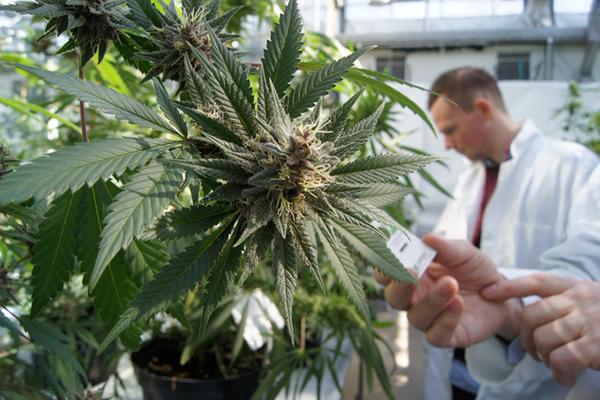
Researcher makes the case for use of Medical Marijuana http://dld.bz/dThRK
… #marijuana #cannabis #MME #cbd #thc
Cleveland: Researcher makes the case for use of medical marijuana
September 8th, 2015by Dr. Clif Cleavelandin Life Entertainment
Marijuana is the popular name for cannabis, a plant genus that contains three species. Although often highlighted for its controversial use as a recreational drug, cannabis has drawn increasing attention in recent years for its use in a variety of medical conditions.
Cannabis is chemically complex, containing more than 85 substances (cannabinols) that have biological effects. One cannabinol, tetrahydrocannabinol (THC), stimulates specific receptors in the brain to cause a range of effects, including euphoria. THC is the major factor in the recreational use of cannabis; the other cannabinoids have no known psychoactive effects but have been increasingly used in the treatment of disease.

Clif Cleaveland
Photo by Contributed Photo /Times Free Press.
The U.S. Food and Drug Administration classifies cannabis as a Schedule I drug with a risk of addiction and no accepted medical benefits. Yet two synthetic cannabinoids have FDA approval for medical use. Dronabinol may be used to stimulate poor appetite in HIV patients, while nabilone may be employed in the treatment of severe nausea and vomiting associated with cancer chemotherapy. Epidolex, which contains a plant-derived cannabinol, has been approved recently to treat a rare seizure disorder in infants and young children.
Twenty-three states and the District of Columbia have approved cannabis for widely varying medical uses that include treating glaucoma, post-traumatic stress disorder, Crohn's disease, complications of multiple sclerosis, rheumatoid arthritis and chronic pain. There is no uniformity among these state-based regulations; each state requires certification to obtain cannabis for medical purposes.
Two articles and an editorial in the June 23 issue of The Journal of the American Medical Association provide a valuable overview of medical cannabis. One of the reports provides a "meta-analysis" of published studies of therapeutic cannabis.
A meta-analysis employs rigorous, statistical techniques to evaluate clinical studies for quality, safety and bias. Randomized clinical trials (RCTs) represent the gold-standard in the evaluation of a medication. An RCT might compare cannabis against a placebo in treating patients with a muscle-spasm disorder. Patients would be randomly assigned to a group that received cannabis or an inactive placebo. In a double-blind study, neither the person administering medication nor the patient would know what was being given. At the end of a planned timeframe, results would be compared between the two groups. Often in such studies, a small percent of persons in the placebo group report improvement in symptoms.
In the cannabis meta-analysis, which used thousands of reports, the authors identified 79 uses that met the rigorous standards for inclusion in the analysis. The meta-analysis provided support for the use of cannabanoids in treatment of chronic pain related to injury or disease of nervous tissue or to cancer. Muscular spasticity in patients with multiple sclerosis was also diminished. Studies of lesser quality supported use of the drugs to treat nausea and vomiting stemming from cancer chemotherapy, reversing weight loss in HIV patients, improving sleep disorders and relieving some of the muscular symptoms of Tourette syndrome.
A variety of short-term adverse reactions were noted in the studies. Among the most frequent were dizziness, dry mouth, nausea, fatigue and sleepiness. None of the studies identified long-term side effects.
A clinical review in the same issue of The Journal of the American Medical Association covered indications for medical use of cannabis and the process of certification for patients to obtain the drug. The author included a risk-and-benefit analysis, emphasizing the possible psychological and nervous system problems that might arise from short term use. Some of these effects may impair driving skills, increasing the risk of crashes.
Future applications of cannabis in medical therapy will depend upon carefully planned and executed clinical studies. These studies may identify individual cannabinols that are safer and more effective alternatives to currently available medications. The studies could lead, in turn, to more uniform indications for cannabis use.
Contact Clif Cleaveland at cleaveland1000@comcast.net.
No comments:
Post a Comment